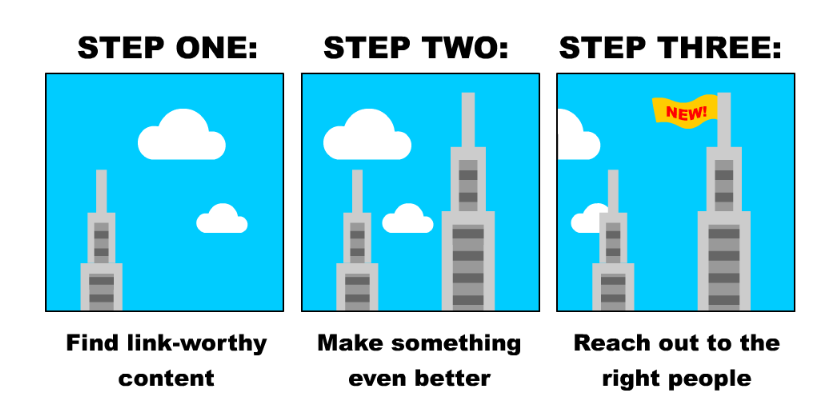Building high-quality backlinks is a crucial aspect of off-page SEO that can significantly improve your website’s authority and search engine rankings.
What is Backlink?
Backlinks, also known as inbound links or incoming links, are links that point from one website to another. In the context of search engine optimisation (SEO), backlinks are essential because they play a significant role in determining a website’s authority, credibility, and search engine rankings.
When one website links to another, it is like a vote of confidence or a recommendation from the linking site. Search engines, such as Google, consider backlinks as a signal of a website’s popularity, relevance, and trustworthiness. Websites with a higher number of quality backlinks are often seen as more authoritative and are more likely to rank higher in search engine results pages (SERPs) for relevant keywords.
In this detailed guide, we’ll walk you through the process of acquiring backlinks from reputable sources and implementing effective link building strategies.
Let’s get started!
Step 1: Understand the Importance of High-Quality Backlinks
Backlinks, also known as inbound links, are links from other websites that point to your site.
Search engines view backlinks as a vote of confidence in your content, indicating that other websites find your content valuable and worth referencing.
However, not all backlinks are equal.
High-quality backlinks come from authoritative, relevant, and trustworthy websites within your industry.
Backlinks from reputable and authoritative websites carry more weight and positively impact a site’s SEO efforts.
On the other hand, backlinks from low-quality or spammy websites can have a negative impact and may even lead to penalties from search engines.
SEO professionals and website owners often engage in various link-building strategies to acquire high-quality backlinks.
Some common methods include creating valuable content that naturally attracts links, guest posting on authoritative websites, broken link building, participating in industry forums, and leveraging social media to amplify content and gain exposure.
Step 2: Identify Link-Worthy Content
Before reaching out for backlinks, ensure that you have high-quality, valuable, and shareable content on your website.
Content that educates, entertains, or provides unique insights is more likely to attract backlinks naturally.
Step 3: Conduct Competitor Backlink Analysis
Perform a backlink analysis of your competitors’ websites to identify potential linking opportunities.
Use tools like Ahrefs, SEMrush, or Moz to view their backlink profiles and discover websites that link to them.
Reach out to these websites with a pitch to link to your relevant and valuable content.
Step 4: Guest Posting on Relevant Websites
Guest posting is an effective way to earn high-quality backlinks and increase your brand’s visibility.
Identify authoritative websites within your niche that accept guest contributions.
Contact the website owners or editors with well-crafted pitches that showcase your expertise and offer valuable content ideas.
Step 5: Leverage Content Promotion and Outreach
When you create exceptional content, it’s essential to promote it and reach out to relevant websites, influencers, and bloggers in your industry.
Use email outreach to introduce your content and ask for potential backlinks.
Personalise your emails and highlight the value your content brings to their audience.
Step 6: Build Relationships with Industry Influencers
Building strong relationships with influencers and thought leaders in your industry can lead to organic backlinks.
Engage with them on social media, comment on their blog posts, and share their content.
Over time, they may naturally link to your valuable content.
Step 7: Create Linkable Assets and Resources
Linkable assets are valuable resources or tools that other websites would want to link to.
Examples include infographics, comprehensive guides, research studies, and interactive tools.
Invest in creating these assets to attract natural backlinks.
Step 8: Participate in Industry Forums and Q&A Platforms
Engaging in industry-related forums and Q&A platforms like Quora or Reddit allows you to showcase your expertise and provide valuable insights.
Include relevant links to your content where appropriate, but always focus on delivering value first.
Step 9: Get Listed in Relevant Directories and Resource Pages
Look for niche-specific directories and resource pages that list websites related to your industry.
Submit your website to these directories to gain relevant backlinks.
Step 10: Monitor Your Backlink Profile
Regularly monitor your backlink profile using tools like Google Search Console, Ahrefs, or Moz.
Keep track of new backlinks, and disavow any spammy or low-quality links that might harm your website’s SEO.
Conclusion
Building high-quality backlinks requires a strategic approach, persistence, and the creation of valuable content.
By following this comprehensive guide and leveraging various link-building tactics, you’ll enhance your website’s authority and visibility in search engine rankings.
Remember to focus on quality over quantity and build relationships within your industry to attract natural backlinks over time.
Happy link building!







